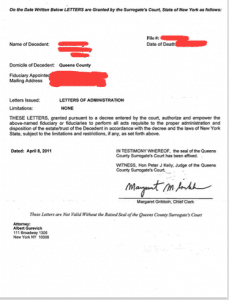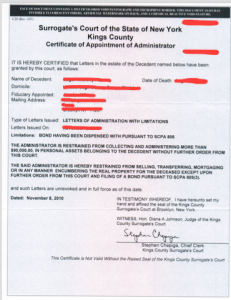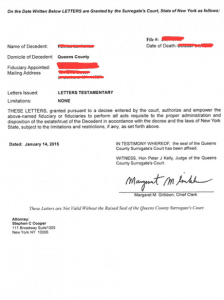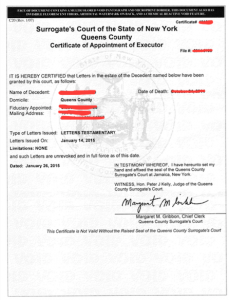The difference Between Administrator and Executor
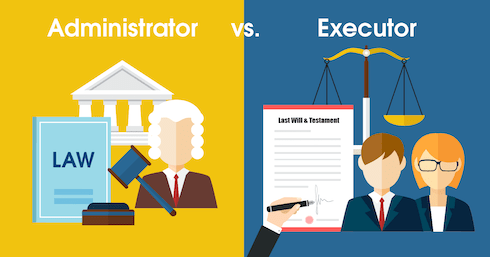
The difference between administrator and executor of estate comes down to how the person came to be in charge of the estate. Someone who is appointed through the will of the person who died is called executor. Someone who is appointed because of any other reason is called administrator.
There is not much difference between them. Because of that, many states have abolished the difference between administrator and executor altogether. Instead, they call any person in charge of an estate personal representative.
The difference between administrator and executor is somewhat like the “Ms. vs Mrs.” of New York estate law. It’s not a big difference, but it exists nevertheless and can be awkward and sometimes legally significant when misplaced.
What is an Estate Administrator
An estate Administrator is usually someone who is appointed by the court to be in charge of an estate of a person who died without a will.
The person most closely related to the person who died has the biggest preference in being appointed the executor of their estate. Here is the order of preference of becoming an estate administrator:
-
- spouse
- children
- grandchildren
- father or mother
- brothers or sisters
- and if none of those are found, then to the person who is entitled to the larges share of the estate (NY SCPA 1001(1)).
If no relative steps forward, then the public administrator of the county where the decedent lived steps forward and becomes the administrator of the estate. The public administrator is also involved in any estate where the administrator is a cousin, niece or nephew or further relationship to the decedent.
An administrator can also be appointed if the executor originally named in the will is not available, when the executor either cannot be found, died, cannot or do not want to serve as the executor of estate or executor of will.
An administrator will receive Letters of Administration from the Surrogate’s Court. They look something like this:
The administrator of estate will also receive Certificates of Administration from the court, as many as they request (at $6 each) to present to banks and other institutions when they marshal the assets of the estate. When looking at the difference between administrator and executor, the documents issued by the Surrogate’s Court are pretty similar and have a similar effect. This is what a Certificate of Appointment of Administrator would look like:
What is an Estate Executor
An estate executor is someone who is in charge of an estate due to being nominated in the will. Being nominated as an executor in a will in and of itself is not enough to start acting on behalf of an estate. One has to first go through the probate process and be appointed by the court and receive a legal document called “Letters Testamentary.”
Letters Testamentary is a document has many safety features, such as watermarks. It looks similar to other New York documents that have to do with birth and death: Letters Testamentary look similar to a birth certificate or death certificate. The executor of estate will receive Letters Testamentary from the Surrogate’s Court. It would look something like this:
Once appointed, an executor will receive enough Certificates of Appointment of Executor to present to every bank and other institution when they marshal the assets of the estate. The Certificates of Appointment also have watermarks and security features. The certificates cost $6 each and can be obtained from the cashier in the courthouse. The difference between in the difference between administrator and executor of estate is not a big one in this regard either. The certificates look very similar. This is what a Certificate of Appointment of Executor of estate (executor of a will) would look like:
A female administrator used to be called administratrix and a female executor used to be called executrix but that definition no longer plays a role, as that distinction has been eliminated by the courts in favor of gender-neutral language. It is now against court rules to refer to someone as administratrix or executrix, only executor or administrator is allowed. Administratrix and executrix are terms that only pop up occasionally, in older wills that were executed before this court rule went into effect.
Not much difference between Administrator and Executor
Once an executor or administrator is appointed by the court, they can start performing their duties in accordance with New York law.
The duties include things like finding (marshaling) the assets of the decent, paying debts taxes and fees and distributing the assets in accordance with the will. It is important to perform those functions correctly, so that all beneficiaries receive their shares and all proper creditors get their claims satisfied. Otherwise, the person in charge of the estate may risk being personally liable to the beneficiaries or creditors of the estate. No difference between administrator and executor in that regard.
There are more checks on the Administrator
One important difference between administrator and executor is that when a person applies to be an executor, all the court is doing is essentially confirming the decedent’s own appointment. When a person applies to be administrator, however, the court will do some additional checking.
When a person is appointed as an executor, a bond is usually not required, because most standard wills state that the executor can serve without bond. For administrators, however, the court is more likely to require a bond. A bond is insurance against theft or mismanagement involving the estate. The difference between administrator and executor of an estate in this regard can come down to bond vs. no bond.
An Administrator can be required to show their kinship
Another difference between administrator and executor is that the potential administrator may be required to show how they are related to the decedent, in order to demonstrate to the court that they are the closest living relative and as such, have the preference to serve as the administrator. This is called kinship.
The person applying to be an administrator may be required to obtain consent from other relatives who are as closely related as the potential administrator is. Or they may be required to officially notify those relatives of their intent to become the executor.
Depending on the situation, the potential administrator may be required to submit a family tree affidavit showing all the relatives of the decedent starting with their parents or grandparents as to how the potential administrator is the closest living relative to the decedent. This is especially true if the administrator is the sole surviving distributee of the estate or is a non-relative. The family tree affidavit has to be signed by a disinterested person.
In some situations, it may be sufficient to have the family tree affidavit be signed by a person with the knowledge of the family tree. In other situations, the potential administrator may need to show documents in support of the family tree, such as birth and death certificates. Making family trees and showing such documents can be pretty difficult, especially if the person who died or their ancestors immigrated from another country. The difference between administrator and executor of an estate is that executor is less likely to be asked to show kinship since they are already designated by the Last Will and Testament of the person who died to serve as the representative of their estate.
An Administrator is more likely to be required to post a bond
An important difference between administrator and executor: Most executors are not required to post a bond. This is especially true of the majority of executors where the will says that the executor is not required to post a bond.
Administrators, however, are often required to post a bond for the entire value of the estate.
A bond is essentially insurance that covers losses to the estate, with yearly payments to the insurance company that underwrites the bond. A person with a low credit score would have more difficulty getting the bond and consequentially more difficulty becoming an administrator of an estate.
Restrictions on the Administrator
When an administrator is appointed, courts of most New York counties restrict their powers. Kings County Surrogate’s Court is especially well known for this. For example, the court might restrict their powers to collecting only $200,000, or restrict their powers to sell real estate such as a house, requiring them to make an extra application to the court to collect over $200,000 or to sell a house.
If the probate or administration are contested, then there can be more restrictions, no difference between administrator and executor. If there are people who object to the appointment of an executor or administrator, things get more complicated. The same goes for when the court is suspicious of something. If that happens, the courts may require additional proof from an executor or administrator before they get appointed, such as additional kinship information and a kinship hearing or a kinship trial. The court may also hold hearings on the qualification of the person who is asking to be in charge of the estate. Courts can place additional restrictions on appointment, such as restricting letters of administration of an administrator or requiring an executor to post a bond even if the will states that the executor is to post no bond. No difference between administrator and executor in this regard – both can be restricted and bonded by the court.
Preliminary Executor
If someone is objecting to the appointment of an executor, or the court is waiting for additional documents, but assets of the estate need to be taken care of, the court can issue preliminary letters testamentary, which give a person the power to take care of the estate assets but does not give them the power to disburse the assets to the beneficiaries of the estate.
In recent times, we have noticed that courts are more reluctant to appoint preliminary executors, as the extra work puts a strain on the court’s resources. We are trying to not apply for preliminary executorship unless necessary in the case. The difference between administrator and executor in this regard is that there is no such thing as a preliminary administrator. Only an executor can be preliminary.
Notice to all heirs and potential heirs
Both potential administrator and executor have to give the proper notice to people affected by their appointment to that role.
A person who wishes to get appointed as the executor has to give notice of the probate proceeding to everyone who inherits under the will, relatives who would have inherited if not for this will, and people who would have inherited under a prior will that was overwritten by the current will.
Notice of probate is sufficient for people inheriting under the will. For people whose prior inheritance rights are terminated by the will, a citation issued by the court will be required.
A person who wishes to get appointed as an administrator of estate needs to give notice to everyone who stands to inherit from the person who died (“distributees”).
In order to get appointed to be in charge of an estate, the potential executor or administrator will need to either obtain written waivers and consent of the people they notified or have to schedule a hearing date where the people notified of the date have a chance to appear and voice any of their reservations. Whether executor or administrator, it applies to both of them.
Affidavit of sole heirship
Whenever an executor or administrator is the sole heir of the decedent, they may be required to submit an affidavit of sole heirship, whereby a non-interested party who is familiar with the family of the person who died or a professional genealogist or perhaps even the attorney representing the executor who did the right research signs an affidavit which explains the family situation of the person who died and how it worked out that the person who died left only one heir. No difference between administrator and executor in this regard.
Some states abolished the difference between Administrator and Executor
About 12 States did away with the difference between administrator and executor and just call everyone personal representative. In New York, the distinction still exists so it is important not to mix up those two terms when it comes to the person in charge of the estate.
If you are trying to figure out the difference between administrator and executor of estate, it is likely that you require the services of a New York estate lawyer. I have been helping people deal with estates for more than a decade. My name is Albert Goodwin and I can be reached at (212) 233-1233 or [email protected]. I look forward to securing your estate for generations to come.
